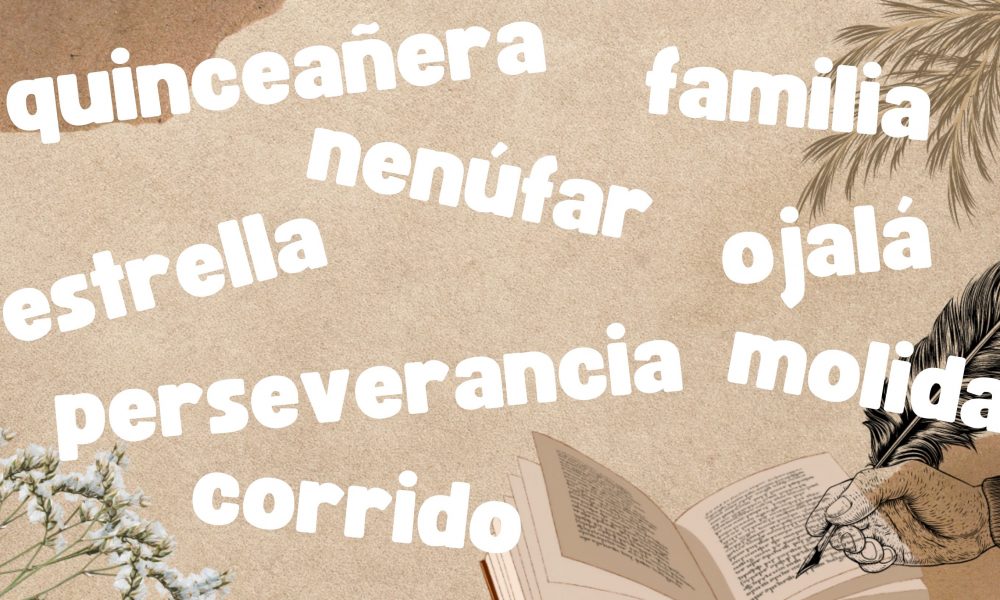
Palabras en español [1]
A few weeks ago, Intermediate Spanish I students were asked to reflect on their favorite Spanish word, or a word in Spanish that has special significance for them. The activity resulted in an intriguing collection of brief texts that include inspiring stories, cool anecdotes and poetic etymological explorations. You can read a selection of these reflections below. We thank our amazing students for their contributions!
 Corrido
Corrido
by Kaylee Shank
‘Corrido’ is a word with many meanings, such as to feel embarrassed, to be in a hurry, or for an object to be continuous, but I am discussing corridos as in a genre of Mexican music and type of ballad. Corridos originated in Northern Mexico and the Southern United States, and they typically recount the crazy lives of Mexican vaqueros, historical events, and what it was like living among the cartels. The word originated from the Spanish word, ‘correr,’ which means to run, signifying the song’s rapid tempo and the fast narration of the stories they tell. I feel a personal connection to this word and what corridos are because I was introduced to them by my boyfriend and his family, who are from Mexico and who I am blessed with because they always share their culture and traditions with me. The ‘Father and King of Corridos,’ Chalino Sanchez, is my favorite corrido artist as he made songs both about life as a narco, and others that have deeper meanings, such as his most famous song ‘Alma Enamorada,’ which he wrote about the pains of being in love. Chalino Sanchez remained a dedicated artist up until his assassination after one of his concerts. Still today, corridos are one of the most popular types of Mexican music, and listening to them and dissecting their meanings is a truly fun way to expand one’s Spanish comprehension skills.

Estrella
by Gabrielle Eicher
The word I am choosing is ‘estrella.’ Estrella translates to star or divine strength. I find this Spanish word to not only sound beautiful, yet I love its meaning. Estrella comes from a Spanish origin but with a Spanish twist to the Latin Stella. Estrella finds deeper meaning within its Norse heritage. As a variation to the Old Norse Asta, Estrella may also encompass the meaning ‘divine strength.’ A shining beacon inside and out, it’s no wonder Estrella is one of my favorite Spanish words. It is pronounced as ‘ehs-treh-yah.’ Another reason behind me liking the word is how pretty it sounds when pronounced correctly. Pertaining to my personal experiences and this word, I have to say that ‘Estrella’ correlates best with my experience on campus. Being that it means divine strength and was referred to as a shining beacon, especially in darkness, I immediately think of Valparaiso University. Hearing the word reminds me that I have potential to shine here at Valpo and be others’ beacons of light in this dark world. Overall, I love the word, its origin, and especially its meaning. Estrella is a very pretty word and I am thankful to have had the opportunity to find out more about it through my brief research and writing.

Familia
by Becca Haller
Although it is a simpler word, I chose the Spanish word ‘familia’ which means ‘family’ in English. According to Dictionary.com, the definition for the word family is ‘the basic social unit consisting of parents and their children, considered as a group, whether dwelling together or not.’ My own definition of family however is a group of people who you deeply care for and treasure; it doesn’t matter if you are related or not, if you truly care about someone or a group of people, then those people are your family as well. Originally from Latin, Family has four syllables, sounds rich and full of life and rolls off your tongue when you say it. No matter the language, culture or country you live in, family is something that everyone in the world knows. There is no barrier. Family is a HUGE part of my life, arguably the most important part, and I use it to describe the people who I treasure the most; my parents, my two siblings, cousins, aunts and uncles, grandmas, the list goes on. I enjoy being a part of a family, and having family, but I also find it beautiful to be welcomed into someone else’s family, even if it’s only for a brief amount of time. A couple weekends ago, my friend invited me and another girl to help her mom waitress the buffet at a wedding reception, except it wasn’t a wedding we were working at… it was a Quinceañera!! I had never ever been to a Quince before and it was one of the most heartwarming, exciting and joyful experiences I have ever had. The family of the birthday girl was so supportive and loving and they were so welcoming of us to their celebration! After we were done serving some of them pulled us onto the dance floor and we had just the best time ever! This girl’s large family reminded me of my big family and how much I treasure them, and it was just such a joyful experience in total.

Molido/a
by Julia Pastore
Molido/a; Past participle of Moler. Dictionary definition: Moler 1: to grind (coffee, wheat). Molida sounds similar to the Latin word ‘mola’, which means ‘mill’. This makes sense to me, because back in the day, windmills were used to grind wheat into flour. Moler, the verb that comes from molida, is a stem changing verb from ‘o’ to ‘ue’. Molido sounds very simple and natural when I pronounce it. Last summer, when I went to a Mexican bakery, an English-speaking woman came up to the counter and asked the clerk what was inside some plastic jars that were on the shelves. The jars had some sort of gold-colored powder in them with what looked like herbs and spices. The clerk did not understand the lady’s question so she asked me in Spanish if I was bilingual. I understood enough to say, ‘Hablo solo un poco de español,’ which was a big deal for me because it was the longest Spanish sentence I had said to a person (I had been practicing with an app). I thought maybe the jars had corn in them, so I asked, ‘¿Maíz?’ ‘No,’ the clerk said. She described them more, but the only word I heard was ‘molida.’ The English-speaking lady still did not understand, so I looked up ‘molida’ and saw that it meant ‘ground’. This was the first time I ever looked up a Spanish word for someone to help translate. The clerk also said, ‘pollo,’ and from that we were able to figure out that it was breading for chicken or meat. When I looked up ‘molida’ and ‘pollo,’ I found that there is a common Mexican dish called ‘milanesa de pollo,’ which is breaded chicken, usually served with potato wedges or rice. According to the recipe, the seasoned breading for this dish is sold at Mexican meat markets and bakeries.

Nenúfar
by Elinor Grochowski
Nenúfar means water lily, or the genus Nymphaea. The word made its way from the medieval Persian word nīlōpal to the Arabic word nīlūfar, which, due to phonetic assimilation, was generally pronounced nīnūfar. From this assimilated pronunciation, the Spanish word nenúfar arrives, and after some Latinization and a haplology (the removal of one of two identical syllables), the name for its genus formed as well. Modernist poets like Julián del Casal were drawn to the word, so much so that later poets regarded its use as saccharine and tasteless. Julián del Casal wrote, for instance, ‘Bajo las ramas de copudo roble / y entre las ondas de negruzca charca, / blanco nenúfar, como débil barca, / se balancea sobre el tallo doble,’ in his poem ‘Al carbón’ in 1891, which might be described as overly sentimental. Yet, I would argue it paints a distinct picture of contrasts and soft movement through imagery and alliteration—we might say its success is, certainly in part, due to his word choice of nenúfar. To me, the back and forth of its syllables, ne then nú, and the repetition of the n sound make it a sweet word to speak, and its poetic history makes it all the more charming. Certainly, I can see its appeal to the more syrupy faction of 19th century modernists, who were trying to evoke, as they might say, the texture of the world. The world itself, if I were to be equally sentimental, evokes a water lily: in nenú, the repeating petals, and in far, the flat lily pad.

Ojalá
by Lanna Sirhan
Definition: hopefully, Lord Willing. I believe that this word has its roots in Arabic, and it is a variation of the word/statement In Shaa Allah, which means Lord Willing. There could be this overlap between the Arabic and Spanish languages because, historically speaking, Arab Muslims used to rule over most of the Iberian Peninsula prior to Spanish colonialism and the Crusaders and intermixing between languages is bound to happen when they are in such close proximity. This word really matters to me because I am Muslim myself and I am very appreciative and connected (at least I try to be) to my faith, and sometimes I feel that my identity is misunderstood, or even spoken for me. So, in these instances that I find connections/overlap between who I am and things, or in this case common phrases, with different languages and backgrounds it makes me feel a bit less othered, if that makes sense. I remember learning back in my 11th grade Spanish class that Arab Muslims used to justly rule over Al-Andalus (modern day Spain) and that Spanish and Arabic are alike in some ways, and I just remember being so intrigued at how unique and dynamic the Arab Muslim history was, and how proud I was to be a part of that. In the Islamic tradition, raising hands with the palms facing up is one of the ways we physically pose while making dua (supplication) to Allah (God). This is connected to the word ojalá because as Muslims we defer all of our hopes, dreams, affairs, matters, and struggles to Allah. We understand that nothing happens without His permission. To denote our submission and awareness of the importance of Allah’s will, we always remember to say Lord Willing when we plan something for the future. When we pray, we hold our hands similar to the position depicted above, and we always recognize and testify the importance of Allah Almighty’s Will by remembering that He ultimately decides what happens in the future, hence the statement In Shaa Allah (God Willing) or ojalá (hopefully, God Willing).

Ojalá
by Rachael Brainerd
The word I chose is ojalá which translates to ‘hopefully’ in English in the informal form. I chose this word for a few reasons, one being that I feel it does a good job at representing where I am in my Spanish learning journey. I also think it is a beautiful word in general because of the way it looks and sounds. This word is derived from Arabic. It is taken from the phrase ma sha allah, which means ‘should God will it.’ This word is used to express an intense hope for something to occur, to the point of wishing for divine intervention. Arabic influence came from the Islamic conquest over the Iberian Peninsula. It is pronounced ‘oh-hah-lah.’ I chose this word because I have struggled to understand and learn Spanish for many years, but have struggled greatly due to my ADHD and difficulties that I find myself having in educational settings. Despite my long term struggle with the language, I find it beautiful and really do want to learn and be able to communicate in Spanish, while also possessing an appreciation for the culture in which it comes from. I have also struggled with Spanish because I often felt pressured by others to learn it without getting the opportunity to choose it myself. Studying Spanish further in college has shown me so much more beauty in the language and culture, and I am glad for the opportunity to take another try at it.

Perseverancia
by Aidan Vazquez
My chosen word is perseverance or la perseverancia. Perseverance means you keep going and never give up. The Spanish translation is: La perseverancia significa seguir adelante y no darse nunca por vencido. The word originates from the 1300’s in the Latin word persevērāre, which means to persist. The roots from the word have different meanings. The root ‘per-,’ means through or pass through. The root ‘-ance,’ means act of, state of being, or thing that. There aren’t any peculiarities with the word specifically, other than it is commonly misspelled. The pronunciation of the word is as follows: (puhr-suh-vi-rihns). I have many connections to the word specifically; one of which can be connected to my life story. I was born prematurely at twenty five weeks. I weighed one pound and was about a foot long. I had a twin sister, but she passed away three days after we were born. I spent three months in the hospital on an incubator. The doctors gave me a one percent chance of survival, but I proved them wrong. The beginning of my life has factored into other parts of my life. I have always been susceptible to diseases, due to my lungs not being strong enough. This is one of the reasons as to why I have been susceptible to pneumonia six times. My body isn’t always strong enough to fight off diseases alone. I have never let the challenges of having a compromised immune system stop me. I am more wary of my surroundings and how my body can be affected by diseases, but I have never given up on myself and have always been able to recover. Staying positive, in part with perseverance, has always allowed me to push through and get better whenever I am sick. The challenges in my life have shaped me into the person I am today; one that doesn’t give up when things get tough.

Quinceañera
by Joslyn Rodriguez
The definition of a Quinceañera is ‘a celebration of a girl’s fifteenth birthday and her transition from childhood to adulthood, typically involving a mass followed by a party.’ Quinceañera literally means, ‘fifteen-year-old.’ ‘Quince’ means 15. This tradition originated in Mexico as early as the 5th century B.C. The word used to be confusing for me to pronounce, but after I went through the process of having a Quince, it grew on me. When I was 14 years old, I chose to have a quinceañera instead of getting a car. Planning it was very difficult, especially because I am my parents’ first Hispanic daughter and this was the first time we’ve ever had to plan anything like this. This connects with my personal experiences with Spanish because back then, I didn’t know that much Spanish. I couldn’t even hold a conversation with my family members. So planning this was hard because I had to accommodate my guests, but I also had to understand what was going on during the mass and the party. This word matters to me because it was a huge milestone in my life and it was a very fun, yet stressful experience that I hope every Latina can experience in their lives. Overall, my Quinceañera wasn’t terrible, but it could’ve been better! I think we did pretty good for the first go around with planning a huge party like this one. For my younger sister, we should be a lot better at it!
![Palabras en español [1]](https://blogs.valpo.edu/hispavalpo/files/2024/09/HVBanner-e1726609772331.png)